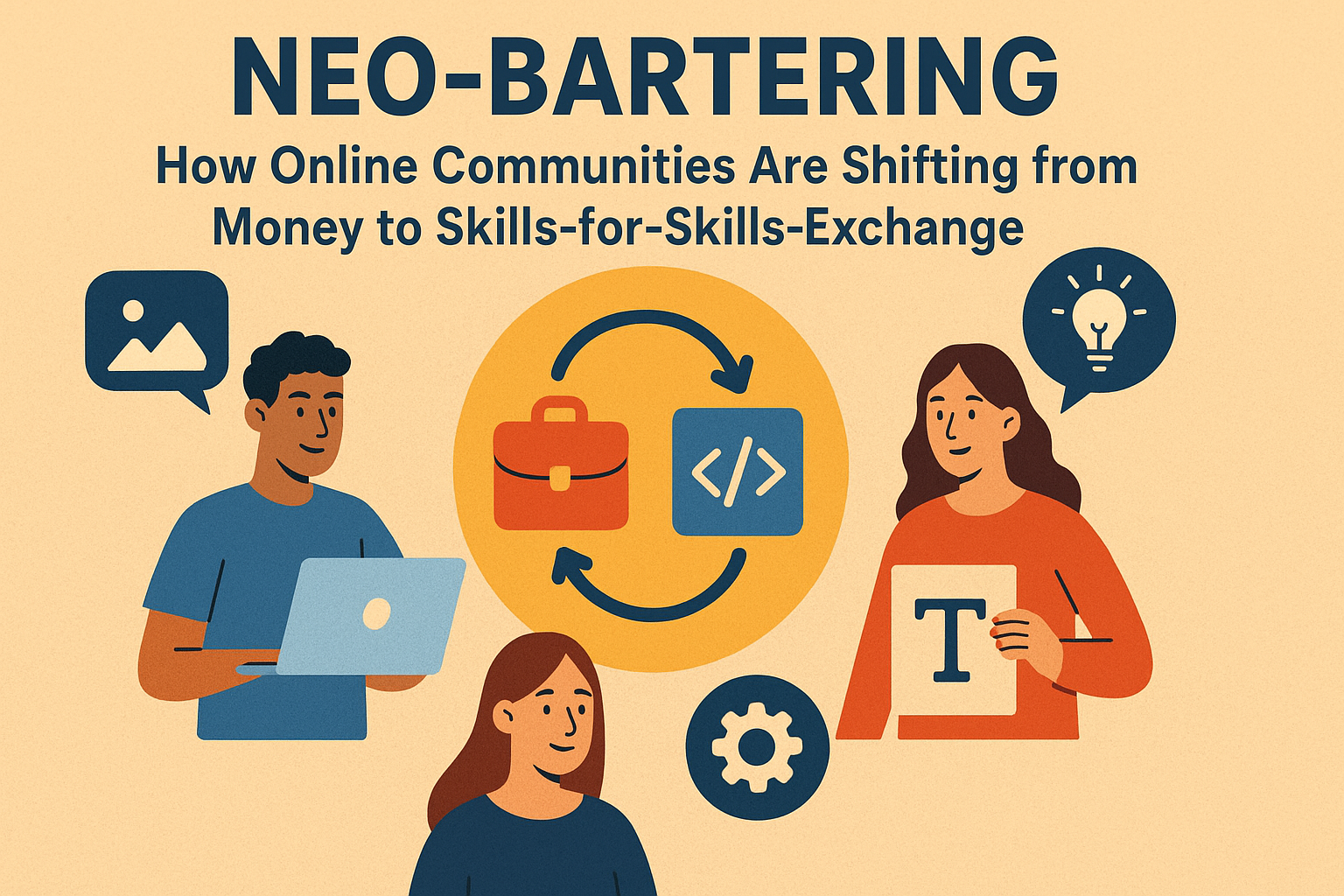Neo-bartering: How online communities are shifting from money to skills-for-skills exchange
Introduction
In a world where money dominated every transaction, change has come and people are trading skills for one another instead of paying with cash. Designers are exchanging logos for writing help, and coders are trading lessons with musicians — the barter system is staging a comeback, but in the digital world instead of a physical one. Online groups are redefining value and proving that being resourceful through a collaboration can be just as valuable as cash. Although this "neo-bartering" movement is about saving and exchanging dollars, it is also thoroughly humane, trusted and connected.

The Digital Renaissance of Old Traditions
Bartering in and of itself is old — as old as mankind. What’s exciting is that like all ‘old’ things, it is coming back in a bright new way — with the internet’s help. Prior to modern economies, we traded things systematically such as grain, tools, or livestock. Today we trade things as diverse as a Photoshop edit for a guitar lesson, marketing advice for coding help, or even content writing for photography. Technology has added a new life to that age-old system, allowing value to be exchanged from the other side of the world, while keeping the trading ‘in work’, without trading money ever happening. In many respects it breaks the transactional elements of modern life and adds humanity and community. The revival reflects an innate desire for equity, creativity, and growth — things that many of us often forget while maximizing the bottom line in our capitalist economies. Neo-bartering reminds us that working together and skill-sharing can create deeper connections than we could ever make with cash.
The Growth of Communities Based on Sharing Skills
If you look at Reddit, Discord, or any of the niche apps geared towards this idea, you’ll see lots of thriving communities focused on sharing skills. A graphic designer may do a logo for a content writer, then the content writer will help a web developer refine their portfolio. Essentially it’s a system of exchanges, based on a mutual respect of specialties. These platforms are not only about saving you money; they are about gaining knowledge, networking, and forging authentic human connection. This differs from traditional, freelancing platforms that operate on bidding wars and fees. These platforms, as mentioned, are focused on trust and sharing. They let people be creative, without concern for money. When you are in a barter system the concern is not what you can afford to get; the question is what do you have to offer. This concept resonates for Gen Z and millennials, who prefer purpose and connection, rather than profit. Therefore, these spaces, based on digital barter, are quietly laying ground for a skills based economy instead of salary based economy.

Trust, Reputation, and the New Social Currency
In this world of skill-for-skill, your value is based upon your reputation. People are not asking you for invoices anymore—they’re checking your prior transactions or your reviews or contributions to community locations. Trust has become the new gold standard. Platforms that support neo-bartering will rely substantially on markers of credibility. These include a verified profile, testimonials, and portfolios of skills. The better your reputation, the more “valuable” you are to the community. It’s an amazing transformation—moving from bank balances as the standard of value to trustworthiness as the measure of worth. This social currency will cultivate a more empathetic economy that values transparency and consistency over rate. And it does, or at least provokes, involvement—philosophically—on how we should measure “value” in the digital age. Are we what we earn—financially—or are we what we contribute? The answer to that question is: when evaluating a neo-bartering scenario, contribution or contribution equates to value over economic rationality. A pattern emerges whereby the focus moves away from financial pretense, and centers more on genuine collaboration, which provides a positive moral reminder: that a strong reputation—built through trust and acts of kindness—can wield much more influence than economic resources.
The Future of Work in an Era of Cashless Collaboration
Picture a day when your résumé is not simply a list of credentials/how many degrees you have but instead is a collection of collaboration. The projects you exchanged skills on, the people you helped, the communities you grew with—that is where neo-bartering is headed—changing how people work, learn, and connect. With the blurring of personal and professional life, there are more people interested in choosing flexibility and purpose over 9-5 employment models. Barter-based collaborative work would most likely be the backbone of a creator and gig economy, reducing the anxiety of formal payment gates and systems, thus allowing people to work on projects driven by their passions and interests. It allows people to be willing to pay with real-time value for opportunities that prove they can have real-time value. It makes opportunities accessible to anyone who has a skill for exchange and allows everyone to contribute regardless of their economic background. This may not mean the ending of all economies based on cash, but it does mean we are moving towards a new construction of productivity and value in contemporary times. The future of work may be cashless, but it will certainly not be less connected, creative, and collaborative.
Conclusion
Neo-bartering represents more than a fleeting experience—it’s a subtle transformation towards a more collaborative and human economy. It questions whether money is the sole medium of value, while it reminds us that skills, creativity, and trust can facilitate building stronger relationships. As digital communities grow, this exchange of talent over transaction shapes how we work, learn, and create together. At the end of the day, true wealth is not about what we accrue—but what we contribute.
